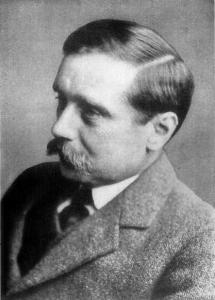Spoiler alert.
Oh, Ann Veronica, Ann Veronica! You had me, growing up in the 1970s, from the start. I sympathised with your yearning for independence and fulfilment. I felt your exasperation with your narrow-minded relatives. I wanted you to unwrap your ‘wrappered life’. And in a way you did, in spite of the society in which you lived. But you and I reckoned without your creator, H G Wells, reining you in.

H G Wells
———-
Ann Veronica Stanley is frustrated, living her half-life in a middle-class suburb: ‘a functionless existence varied by calls, tennis, selected novels, walks and dusting in her father’s house’. There is the possibility of marriage with Hubert Manning, a civil servant by profession and by aspiration a poet (‘… rather carefully finished verse’). The scene where, during a tea-party, Manning gets Ann Veronica to a secluded part of the garden, in order to propose, is beautifully judged: ‘Do come and see the Michaelmas daisies at the end of the garden.’ Need I say that, if they married, she would find him boring and he would find her really rather difficult?
Education is the one good thing in Ann Veronica’s life. She is allowed to take science classes at a women’s college. She would prefer university. In 1909, she could have graduated from the University of London, which awarded degrees to women from 1878, while it took Oxford until 1920 and Cambridge until 1948, for heaven’s sake. But higher education strains her father’s sense of the appropriate. ‘He had … argued with a Somerville girl at a friend’s dinner-table and he thought that sort of thing unsexed a woman.’
Ann Veronica’s father is a solicitor whose hobby is microscopic petrography. His idea of pleasure is an evening in his study, tutting over the conclusions of other petrologists, while his womenfolk busy themselves downstairs. He can cope with sons but not with daughters, once they stop being small and sweet. Clearly it never occurs to him that he and Ann Veronica might share their interests in science.
No wonder this New Woman, to use the term of the day, runs away to London. But it is not easy for even a New Woman to manage her life in 1909. Ann Veronica has little money, and there are few jobs for a young, inexperienced middle-class girl. Even getting a room is hard when a woman alone must surely be up to no good.
Now Ann Veronica’s unwrapping of her life starts in earnest:
- she takes a university course, which she enjoys
- she seeks out Fabians whose cause she has supported, only to find them tedious and unworldly. The Fabians’ name is Goope, which says it all
- she becomes a Suffragette and even, in an act which suggests a breakdown, manoeuvres herself a prison sentence: ‘I got myself locked up to cool off. By a sort of instinct. As a dog eats grass.’ On reflection, feminism fails too, as the women are in her view unclear about what they want and how
- she encounters sex and love in the respective forms of Ramage, a neighbour, and Capes, the demonstrator on her course. Ramage (note the name) is a lecher, as anyone more experienced than Ann Veronica would immediately recognize. Their seduction scene is funny but then you realize there’s a threatening undertone. Capes, on the other hand, is young, clever and shares Ann Veronica’s interests.
So in the end Ann Veronica, New Woman, chooses Capes, New Man. Now this is not to diss love and marriage or to under-estimate societal pressures in 1909, but it is frustrating that Ann Veronica accepts the domesticity she earlier rejected. Education, politics and feminism are forgotten. You might think that Ann Veronica has just been going through that teenage phase – all hormonal and difficult – but now, with help from Wells, she’s grown up and settled down, as girls should.
What makes it even more frustrating is that the novel was drawn from life. Its publication was a scandal and there was much roman à clef speculation. A serial philanderer, Wells had an affair with the much younger feminist Amber Reeves. When Amber became pregnant, the couple ran away to France but were later reconciled with their families. Soon after, Reeves married a family friend, saying that this was arranged by Wells and bringing up Wells’ child as her husband’s. Like Ann Veronica, she was tidied away into marriage, although not with the man she loved. Wells went on to other affairs.
——–
In his novel, Marriage, Wells leaves us with a glimpse of you, Ann Veronica, in later years: ‘Mrs Gordon Capes, the dark-haired, quiet-mannered wife … a woman of impulsive speech and long silences, who had subsided from an early romance … into a markedly correct and exclusive mother of daughters’.
What hopes did you have for your daughters, Ann Veronica, after you subsided? What advice did you have for them?

